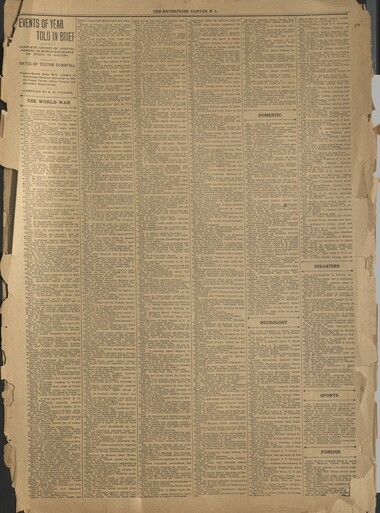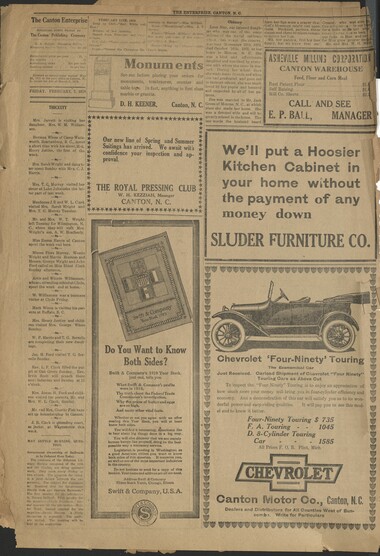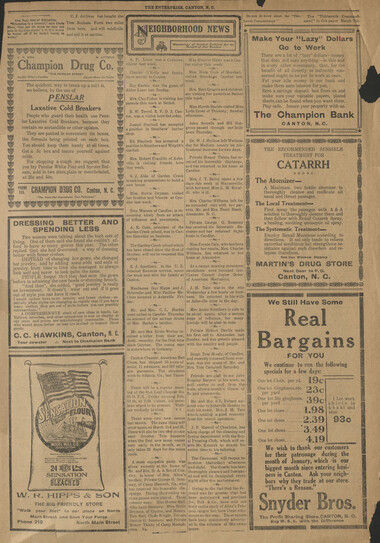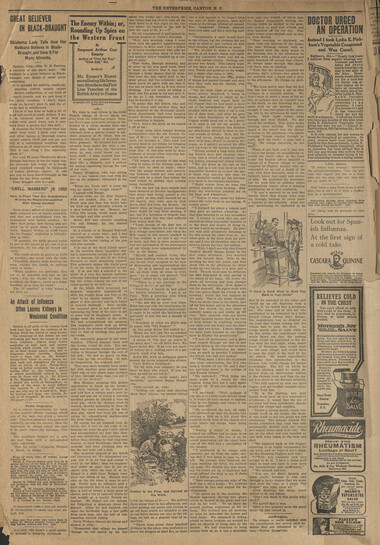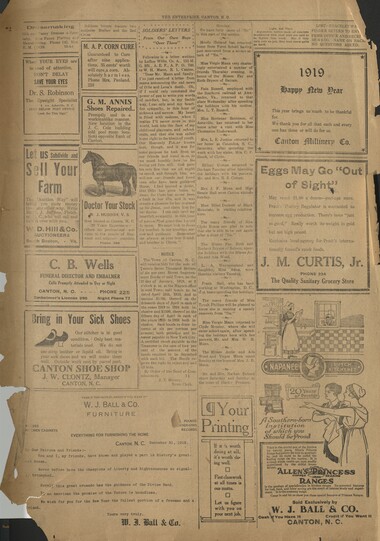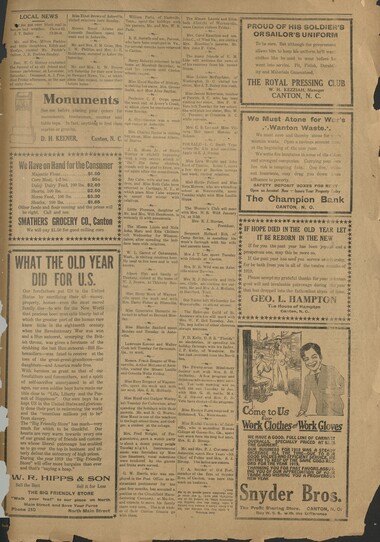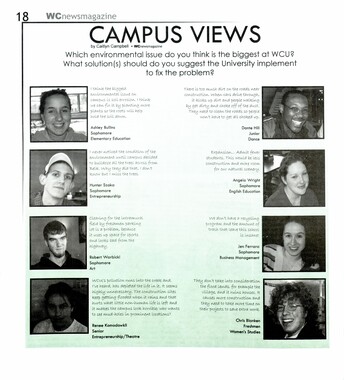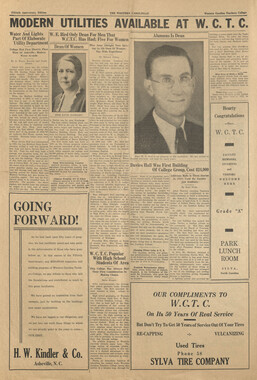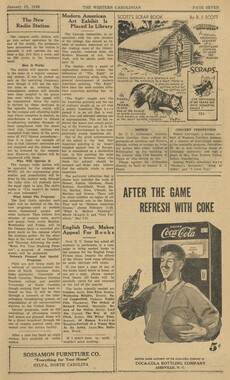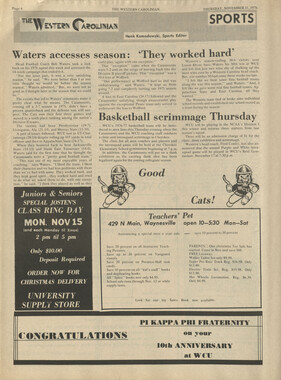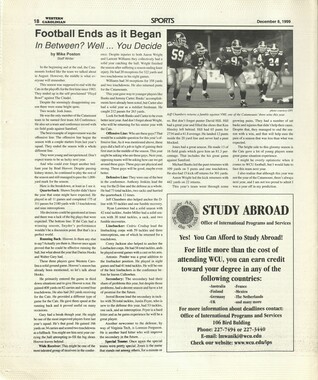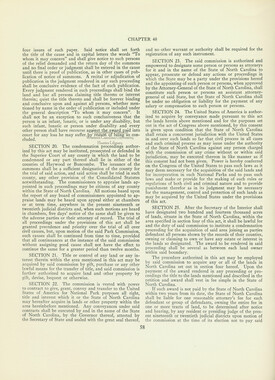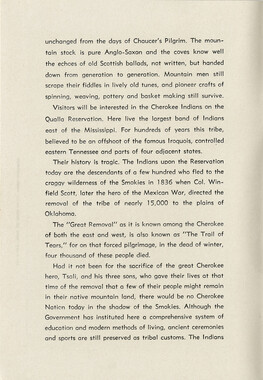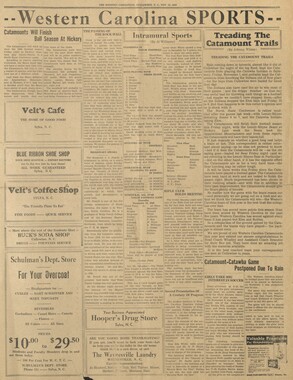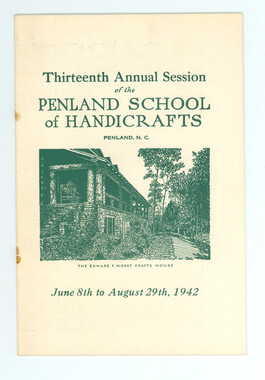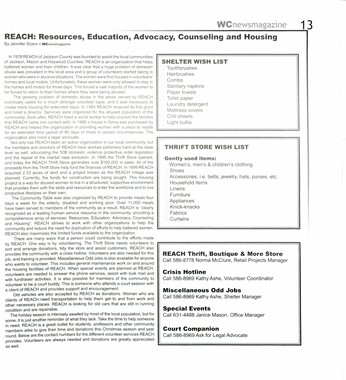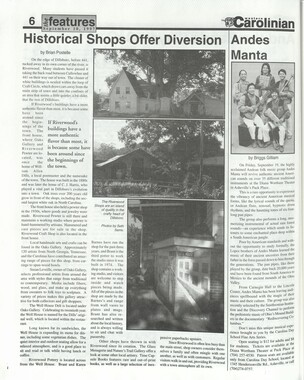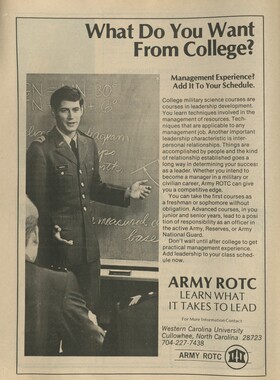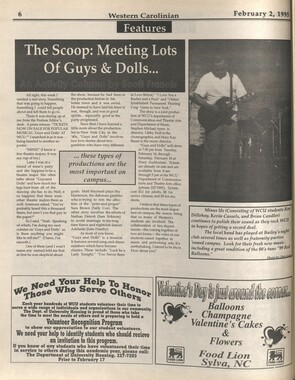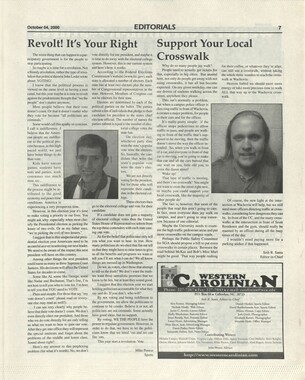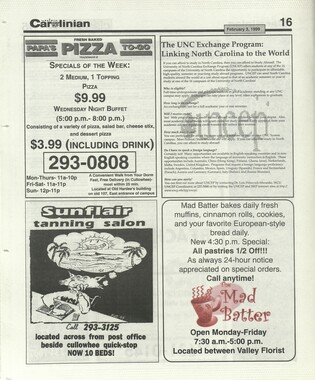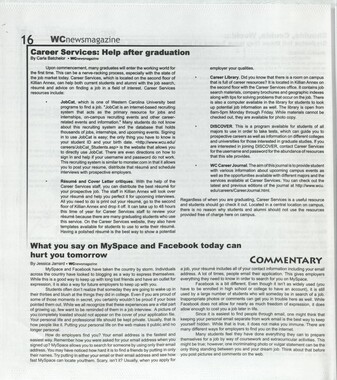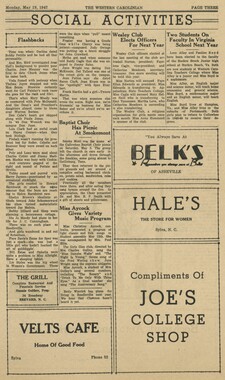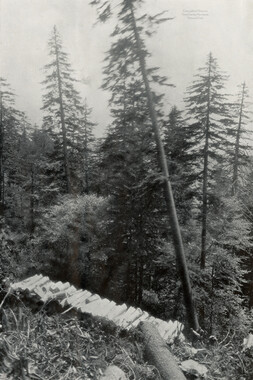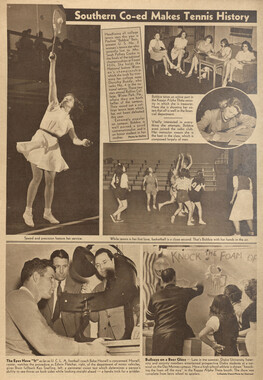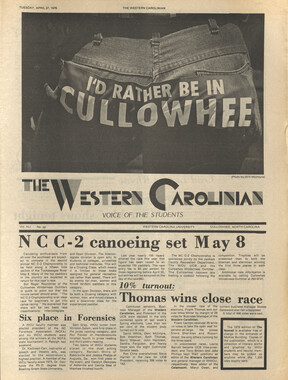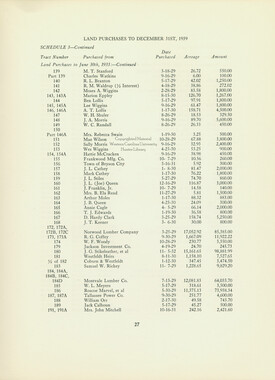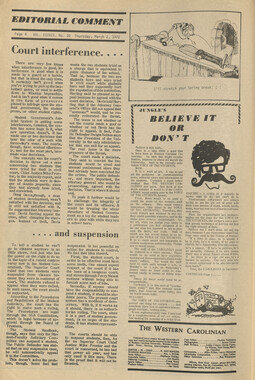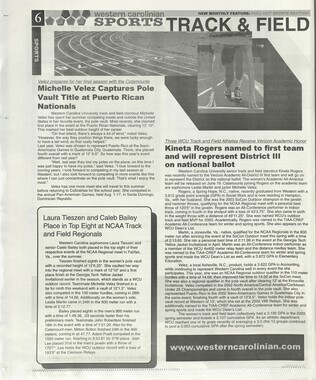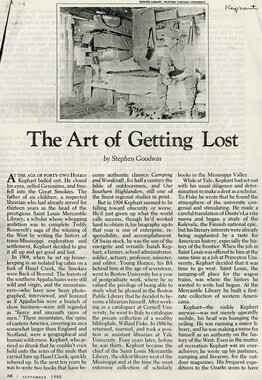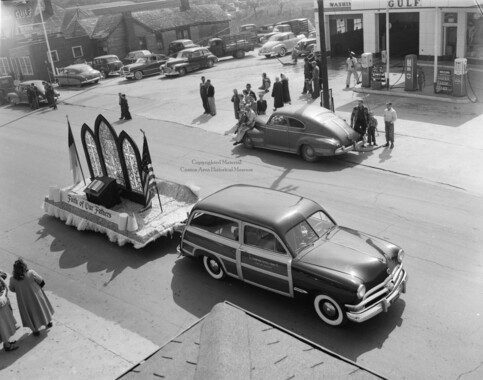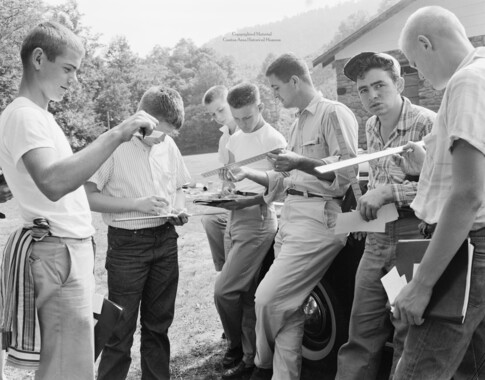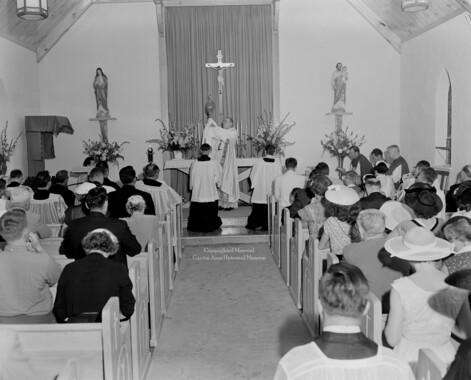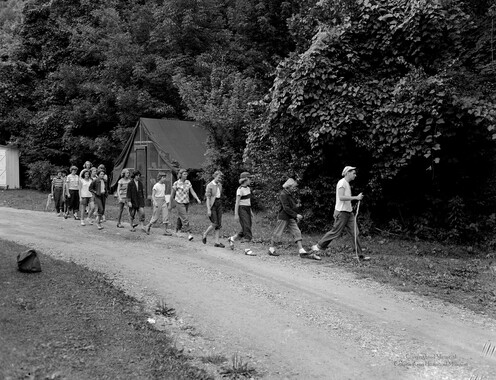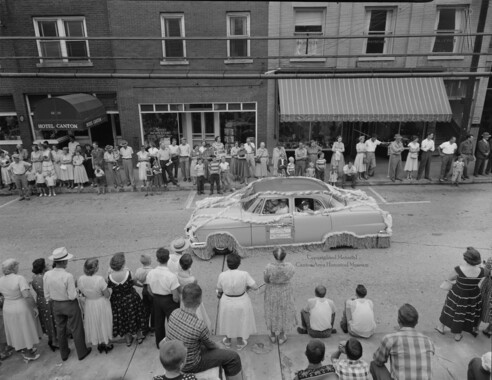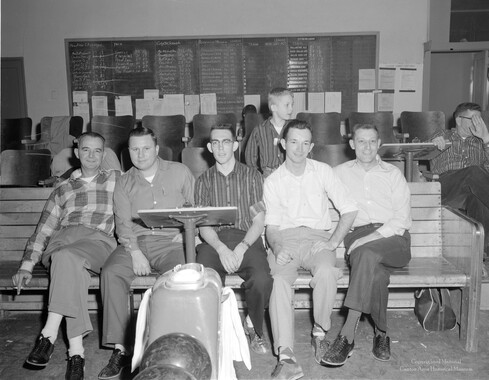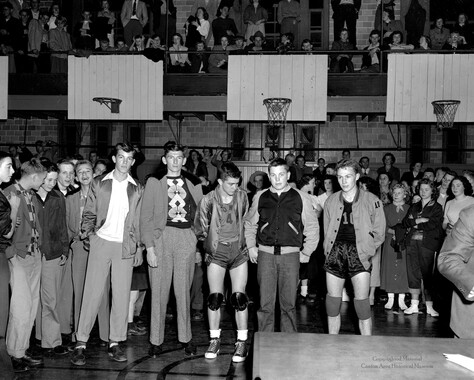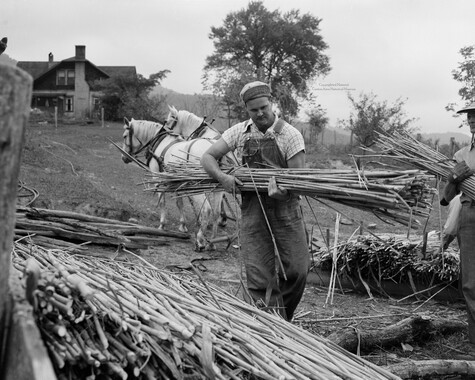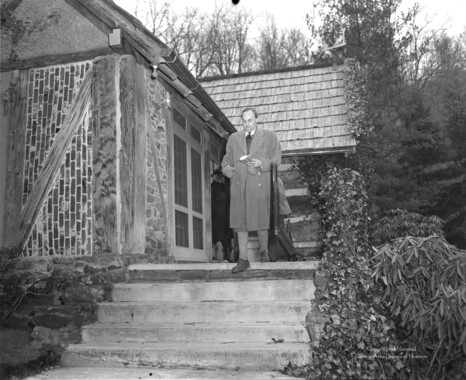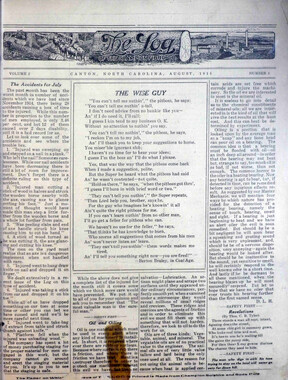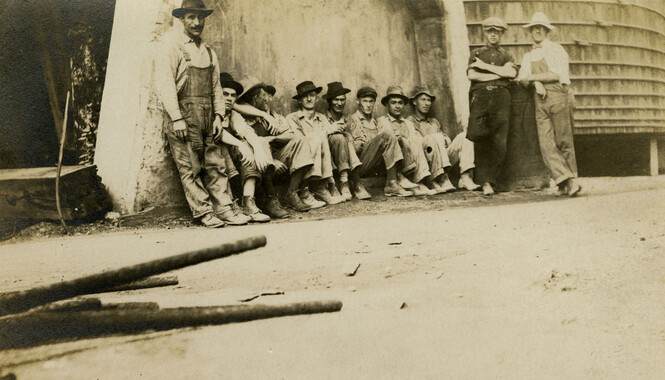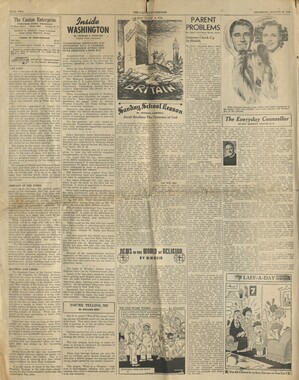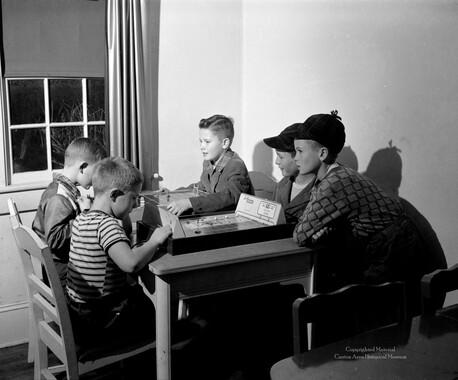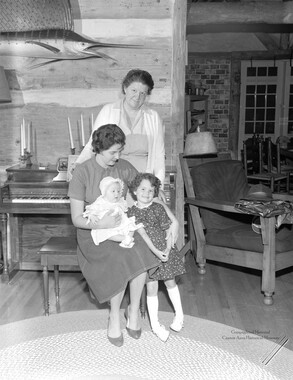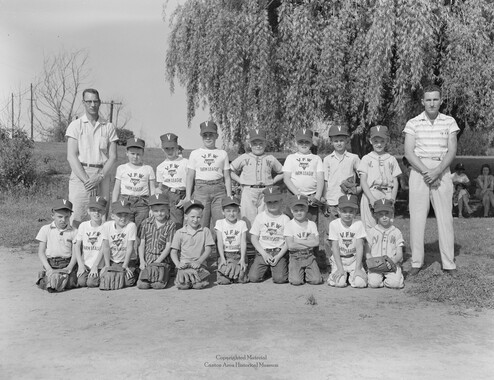Western Carolina University (21)
View all
- Canton Champion Fibre Company (2308)
- Cherokee Traditions (291)
- Civil War in Southern Appalachia (165)
- Craft Revival (1942)
- George Masa Collection (137)
- Great Smoky Mountains - A Park for America (3080)
- Highlights from Western Carolina University (422)
- Horace Kephart (973)
- Journeys Through Jackson (159)
- LGBTQIA+ Archive of Jackson County (89)
- Oral Histories of Western North Carolina (317)
- Picturing Appalachia (6617)
- Stories of Mountain Folk (413)
- Travel Western North Carolina (153)
- Western Carolina University Fine Art Museum Vitreograph Collection (129)
- Western Carolina University Herbarium (92)
- Western Carolina University: Making Memories (738)
- Western Carolina University Publications (2491)
- Western Carolina University Restricted Electronic Theses and Dissertations (146)
- Western North Carolina Regional Maps (71)
- World War II in Southern Appalachia (131)
University of North Carolina Asheville (6)
View all
- Allanstand Cottage Industries (62)
- Appalachian National Park Association (53)
- Bennett, Kelly, 1890-1974 (1463)
- Berry, Walter (76)
- Brasstown Carvers (40)
- Carver, George Washington, 1864?-1943 (26)
- Cathey, Joseph, 1803-1874 (1)
- Champion Fibre Company (233)
- Champion Paper and Fibre Company (297)
- Cherokee Indian Fair Association (16)
- Cherokee Language Program (22)
- Crowe, Amanda (40)
- Edmonston, Thomas Benton, 1842-1907 (7)
- Ensley, A. L. (Abraham Lincoln), 1865-1948 (275)
- Fromer, Irving Rhodes, 1913-1994 (70)
- George Butz (BFS 1907) (46)
- Goodrich, Frances Louisa (120)
- Grant, George Alexander, 1891-1964 (96)
- Heard, Marian Gladys (60)
- Kephart, Calvin, 1883-1969 (15)
- Kephart, Horace, 1862-1931 (313)
- Kephart, Laura, 1862-1954 (67)
- Laney, Gideon Thomas, 1889-1976 (439)
- Masa, George, 1881-1933 (61)
- McElhinney, William Julian, 1896-1953 (44)
- Niggli, Josephina, 1910-1983 (10)
- North Carolina Park Commission (105)
- Osborne, Kezia Stradley (9)
- Owens, Samuel Robert, 1918-1995 (11)
- Penland Weavers and Potters (36)
- Roberts, Vivienne (15)
- Roth, Albert, 1890-1974 (142)
- Schenck, Carl Alwin, 1868-1955 (1)
- Sherrill's Photography Studio (2565)
- Southern Highland Handicraft Guild (127)
- Southern Highlanders, Inc. (71)
- Stalcup, Jesse Bryson (46)
- Stearns, I. K. (213)
- Thompson, James Edward, 1880-1976 (226)
- United States. Indian Arts and Crafts Board (130)
- USFS (683)
- Vance, Zebulon Baird, 1830-1894 (1)
- Weaver, Zebulon, 1872-1948 (58)
- Western Carolina College (230)
- Western Carolina Teachers College (282)
- Western Carolina University (2008)
- Western Carolina University. Mountain Heritage Center (18)
- Whitman, Walt, 1819-1892 (10)
- Wilburn, Hiram Coleman, 1880-1967 (73)
- Williams, Isadora (3)
- Cain, Doreyl Ammons (0)
- Crittenden, Lorraine (0)
- Rhodes, Judy (0)
- Smith, Edward Clark (0)
- Appalachian Region, Southern (3032)
- Asheville (N.C.) (1945)
- Avery County (N.C.) (26)
- Blount County (Tenn.) (195)
- Buncombe County (N.C.) (1680)
- Cherokee County (N.C.) (283)
- Clay County (N.C.) (556)
- Graham County (N.C.) (238)
- Great Smoky Mountains National Park (N.C. and Tenn.) (525)
- Haywood County (N.C.) (3573)
- Henderson County (N.C.) (70)
- Jackson County (N.C.) (4924)
- Knox County (Tenn.) (35)
- Knoxville (Tenn.) (13)
- Lake Santeetlah (N.C.) (10)
- Macon County (N.C.) (421)
- Madison County (N.C.) (216)
- McDowell County (N.C.) (39)
- Mitchell County (N.C.) (135)
- Polk County (N.C.) (35)
- Qualla Boundary (982)
- Rutherford County (N.C.) (78)
- Swain County (N.C.) (2185)
- Transylvania County (N.C.) (270)
- Watauga County (N.C.) (12)
- Waynesville (N.C.) (86)
- Yancey County (N.C.) (72)
- Aerial Photographs (3)
- Aerial Views (60)
- Albums (books) (4)
- Articles (1)
- Artifacts (object Genre) (228)
- Bibliographies (1)
- Biography (general Genre) (2)
- Cards (information Artifacts) (38)
- Clippings (information Artifacts) (192)
- Copybooks (instructional Materials) (3)
- Crafts (art Genres) (622)
- Depictions (visual Works) (21)
- Design Drawings (1)
- Digital Moving Image Formats (2)
- Drawings (visual Works) (185)
- Envelopes (101)
- Exhibitions (events) (1)
- Facsimiles (reproductions) (1)
- Fiction (general Genre) (4)
- Financial Records (12)
- Fliers (printed Matter) (67)
- Glass Plate Negatives (381)
- Guidebooks (2)
- Internegatives (10)
- Interviews (822)
- Land Surveys (102)
- Letters (correspondence) (1045)
- Manuscripts (documents) (618)
- Maps (documents) (177)
- Memorandums (25)
- Minutes (administrative Records) (59)
- Negatives (photographs) (6090)
- Newsletters (1290)
- Newspapers (2)
- Notebooks (8)
- Occupation Currency (1)
- Paintings (visual Works) (1)
- Pen And Ink Drawings (1)
- Periodicals (194)
- Personal Narratives (10)
- Photographs (12977)
- Plans (maps) (1)
- Poetry (6)
- Portraits (4568)
- Postcards (329)
- Programs (documents) (181)
- Publications (documents) (2444)
- Questionnaires (65)
- Relief Prints (26)
- Sayings (literary Genre) (1)
- Scrapbooks (282)
- Sheet Music (2)
- Slides (photographs) (402)
- Songs (musical Compositions) (2)
- Sound Recordings (801)
- Specimens (92)
- Speeches (documents) (18)
- Tintypes (photographs) (8)
- Transcripts (328)
- Text Messages (0)
- A.L. Ensley Collection (275)
- Appalachian Industrial School Records (7)
- Appalachian National Park Association Records (336)
- Axley-Meroney Collection (2)
- Bayard Wootten Photograph Collection (20)
- Bethel Rural Community Organization Collection (7)
- Blumer Collection (5)
- C.W. Slagle Collection (20)
- Canton Area Historical Museum (2110)
- Carlos C. Campbell Collection (462)
- Cataloochee History Project (64)
- Cherokee Studies Collection (4)
- Daisy Dame Photograph Album (5)
- Daniel Boone VI Collection (1)
- Doris Ulmann Photograph Collection (112)
- Elizabeth H. Lasley Collection (1)
- Elizabeth Woolworth Szold Fleharty Collection (4)
- Frank Fry Collection (95)
- George Masa Collection (173)
- Gideon Laney Collection (452)
- Hazel Scarborough Collection (2)
- Hiram C. Wilburn Papers (28)
- Historic Photographs Collection (236)
- Horace Kephart Collection (861)
- Humbard Collection (33)
- Hunter and Weaver Families Collection (1)
- I. D. Blumenthal Collection (4)
- Isadora Williams Collection (4)
- Jesse Bryson Stalcup Collection (47)
- Jim Thompson Collection (224)
- John B. Battle Collection (7)
- John C. Campbell Folk School Records (80)
- John Parris Collection (6)
- Judaculla Rock project (2)
- Kelly Bennett Collection (1482)
- Love Family Papers (11)
- Major Wiley Parris Civil War Letters (3)
- Map Collection (12)
- McFee-Misemer Civil War Letters (34)
- Mountain Heritage Center Collection (4)
- Norburn - Robertson - Thomson Families Collection (44)
- Pauline Hood Collection (7)
- Pre-Guild Collection (2)
- Qualla Arts and Crafts Mutual Collection (12)
- R.A. Romanes Collection (681)
- Rosser H. Taylor Collection (1)
- Samuel Robert Owens Collection (94)
- Sara Madison Collection (144)
- Sherrill Studio Photo Collection (2558)
- Smoky Mountains Hiking Club Collection (616)
- Stories of Mountain Folk - Radio Programs (374)
- The Reporter, Western Carolina University (510)
- Venoy and Elizabeth Reed Collection (16)
- WCU Gender and Sexuality Oral History Project (36)
- WCU Mountain Heritage Center Oral Histories (25)
- WCU Oral History Collection - Mountain People, Mountain Lives (71)
- WCU Students Newspapers Collection (1923)
- Western North Carolina Tomorrow Black Oral History Project (69)
- William Williams Stringfield Collection (2)
- Zebulon Weaver Collection (109)
- African Americans (390)
- Appalachian Trail (35)
- Artisans (521)
- Cherokee art (84)
- Cherokee artists -- North Carolina (10)
- Cherokee language (21)
- Cherokee pottery (101)
- Cherokee women (208)
- Church buildings (190)
- Civilian Conservation Corps (U.S.) (111)
- College student newspapers and periodicals (2012)
- Dams (108)
- Dance (1023)
- Education (222)
- Floods (63)
- Folk music (1015)
- Forced removal, 1813-1903 (2)
- Forest conservation (220)
- Forests and forestry (1198)
- Gender nonconformity (4)
- Great Smoky Mountains National Park (N.C. and Tenn.) (181)
- Hunting (47)
- Landscape photography (25)
- Logging (122)
- Maps (83)
- Mines and mineral resources (9)
- North Carolina -- Maps (18)
- Paper industry (38)
- Postcards (255)
- Pottery (135)
- Railroad trains (72)
- Rural electrification -- North Carolina, Western (3)
- School integration -- Southern States (2)
- Segregation -- North Carolina, Western (5)
- Slavery (5)
- Sports (452)
- Storytelling (243)
- Waterfalls -- Great Smoky Mountains (N.C. and Tenn.) (66)
- Weaving -- Appalachian Region, Southern (280)
- Wood-carving -- Appalachian Region, Southern (328)
- World War, 1939-1945 (173)
The Canton Enterprise Volume 13 Number 01
Item
Item’s are ‘child’ level descriptions to ‘parent’ objects, (e.g. one page of a whole book).
-
-
THE ENTERPRISE, CANTON, N. C. ) f EVENTS OF YEAR TOp BRIEF CP00MW^IE DEFEAT OF CENTRAL POWERS IN WORLD WAR MARKS AN EPOCH IN HISTORY. DATES OF TEUTON DOWNFALL Twelve-Month Ends With Leaders of V.ctcnous Nations Gathered to Set- d!,^6?6 Terms-Other Foreign and Oomest.c Occurrences. COMP.LED BY E. W. P.CKARD. THE WORLD WAR Jan. 1—Italian Flave river fro" .Jan. 4-Presid drove Teuton ve river j „ Zenson loop? Britain's war'"i^.Uoyd Ge°rS* «at.d across p2£J2-.ho"plt* *hiP Rewa UrSeSoed by ,Jan, 5 _ war aims." aatTo'n 'of 30«)'(kf,OIern,ment began moblli- II o J, ">'uw,000 workers. sAbma?iU„Perec?e^°"r,ttUphfld dra" law' ln& 38 officers mutinied at Kiel, km, tei?sn'Wl7Pariml<Jen^ WiIson stated Amer- Jan VCS and peat'e demands. *rate pTa^e ** a"d Bulsaria signed sep- •«Je»'ne1r^ICn?tral P°wers withdrew offer *ratrpeacaP a"d °Kered Russia seP" tlSU?oramon<thGerniany renewed a"nls- GerlLr,/ Sht ,5a'd on Karlsruhe. Uu' s!" bombarded Yarmouth from heacT'of1^^""" Wj,llard resigned as l7.n%vri ' Tvar industries board. D.ir.iir,=TT n "aval action at entrancevto cruida,n &S ,tl,e Brltish sank Turkish ashore. Breslau and foreed the Goeben •unk;' nTu>st!Bh b°ardins sl"P Louvain Jan. -4—Germany and Austria replied to Peace proposals of Wilson and Lloyd tlonsKe' re;lectins the concrete sugges- Jan. 26—Twelve killed by explosion In Newport naval torpedo station Odessa captured by the bolshevik!. Jan. 27—Russian government broke relations with Roumania. Italians began offensive between Asiago and the Brenta. Roumanians look Kishinev. Jan. 2S—German air raiders killed 47 In London. Ukrainians defeated bolshevik troops in three clay battle and took Lutsk. Italians broke through Austrian line, taking 1,500 prisoners. Jan. 30—German air raid on Paris; 49 killed Jan. 31—Bolshevtki took Orenburg. Feb. 3—Allied supreme war council declared war must be carried on to victory government took over von Rintelen and six of conspiracy in New Feb. 4—U. S. control of oil. Feb. 5—Franz others convicted York. Feb. 6—United States transport Tus- cania sunk by torpedo off Irish coast; 204 Americans lost. Feb. 9—Peace treaty between Ukraine and the central powers signed. Feb. 10—Russia declared the war at an end so far as she wcr concerned anil ordered complete demobilization; but refused to sign peace treaty. Feb. 14—Bolo Pasha convicted of treason In France and sentenced to death. Feb. 15—President Wilson put all foreign trade of U. S. under license. Eight British submarine chasers sunk by German destroyers in Dover straits. Feb 16—German aviators attacked London, killing 21. Feb. IS—Germans resumed war on Russia, crossing the Dvlna. Feb. 19—Germans took Dvlnsk and Lutsk; Bolshevtki offered to sign peace treaty. Bolshevik Don Cossack republic organized at Tcherkask, Gen. Kaledines having committed suicide. Feb 20—Germans invested Reval and landed troops In Finland. Feb. 21—Germans took Minsk and Rovno. Jericho captured by the British. Feb. 22—Senate passed Wilson bill to rule railroads. Feb. 23—President Issued proclamation stipulating government guaranteed price for wheat at principal primary markets, prices varying from $2 at Spokane to $2.2S at New York. Feb. 25- Germans captured Reval. Feb. 28—Americans repulsed strong attack In Chemin des Dames sector with heavy losses to attackers. March 1—McAdoo announced third Liberty loan to open April 6. if. S. troops repulsed raid In Toul sector, suffering many casualties; German losses very heavy. British cruiser Calgarian torpedoed; 43 lives lost. March 3—Germans halted Invasion of Russia; Slavs signed peace treaty giving Turkey big slice of territory. March 4—French delivered surprise blow near Verdun, penetrating German lines. British, French and Italian ambassadors asked Japan to take necessary steps to safeguard allied interests In Siberia. British advanced on 12-mlle front In Palestine. March 5—Am?r!cans In Lorraine repulsed German attack and took prisoners. President Wilson refused assent to Japanese intervention In Russia. Bernard M. Baruch named chairman of the war Industries board. March 6—Roumania signed preliminary peace treaty giving up Dobrudja and control of the Danube. March 7—Germany and Finland signed peace treaty. March 8—Trotzky resigned as foreign minister of Russia. British advanced three miles on 18-mlle front In Palestine. British repulsed attack on Ypres-Dix- mude line with heavy losses to enemy. Kleven killed, 46 Injured in air raid on London. ■ March 9 -Nine persons killed In air raid on Paris. March 11—Sixty airplanes bombed Paris; 34 killed. Knemy aviators attacked Naples. Seven killed in hospital. President, In message to Soviets, pledged aid of United States to free Russia from German control. March 12—Ninety-live thousand drafted men called to begin movement to cantonments March 29 British aviators droped ton of explosives on Coblentz. March 13—Germans seized Odessa. March 14—American Rainbow division occupied trenches In Lunevllle sector from which they drove the enemy; first permanent advance by Americans. March 13—Germans repulsed with heavy loss in Flanders by British. All-Russian congress of Soviets at Moscow ratified German peace terms. March 18—Allied supreme war council condemned German treatment of Russians and Roumanians and refused to acknowledge the peace treaties. March 19—American destroyer Ma nicy collided with British war vessel; 16 killed. March 20—America and Great Britain seized 1,000,000 tons of Dutch shipping. March 21—Germans opened heavy attack on British lines north of St. Quentln. March 22—Great battle In France continued. Germans failing to break British line; both sides sustained heavy losses. British In Palestine crossed the Jordan. March 23—British fell back from Ave to ten miles, their lines still unbroken; estimated casualties, German, 250,000; British, 100,000; French and American troops brought up to support British. Paris shelled by new German gun from distance of 76 mil. March 25—Germans took Bapaume, Nesle and Gulscard. March 26—British destroyed entire Turk army near Hit, Mesopotamia, March 27—Germans took Albert and British recaptured Morlancourt and Chip- illy, March 28—French retook three towns and Germans advanced toward Amiens but were Mopped with heavy losses. March W—Gen. Foch put in command of allied armies In France, and Gen. Pershing offered to. him all his troops and :es. Shell iiom German long range gun killed ;.i in a i-atis church. Caucasus, ai' r proclaiming its independence, made separate peace with Turkey. April 4—Germans resumed drive toward Ami,-n3, gaining little at heavy cost. Armenians recaptured F.rzerum from Turks. April 5 -Allies held their lines against heavy attacks. Clin announced the capture of Ekat- erlnoslav, Russia. Japan and Great Britain landed small force at Vladivostok to pretect life and property. April 6—Third Liberty loan campaign i in United States. Provost Marshal General Crowder called 150,000 draft men to colors. April 9—Germans hit British front between La Basse and Armentleres. gaining 3 miles. April 10—Germans drove British back north and south of Armentleres. American troops on tiring line In great battle. April 11—British evacuated Armentieres but recaptured other positions. April 12—Tremendous fighting continued in Inlanders, Germans advancing to Mer- ville. _ , Americans won all day fight on Toul front. . April 13—Turks took Batum. Zeppelin and airplane factory at Man- zel, Germany, burned with great loss. April 14—Count Czernin, Austrian foreign minister, resigned. American navy collier Cyclops, 293 on board, reported missing. April 16—Berlin announced the occupation of Helsingfors by German troops. British warships, sweeping the Kattegat, sank 10 German trawlers. Allies took ten villages from Bulgarians on Macedonian fiont. April 16 — Germans took Bailleul, Wytschaete and most of Messines ridge. C. M. Schwab made director general of U. S. shipbuilding. April 17—Viscount Milner made British war secretary. Baron Burian made Austrian foreign minister. Bolo Pasha executed for treason against France. April 20—Germans made Btrong attack on Americans in Toul sector and took Seicheprey village, but were driven back with heavy loss. April 22—British and French naval forces raided German U-boat bases at Ostend and Zeebrugge and sank concrete- laden vessels at channel mouths. April 25— British drove back Germans east of Amiens. Germans took Mount Kemmel and advanced to northwest, threatening- Ypres. April 26—Germans captured Dranoutre and St. Eloi. April 29—Germans attacked strongly on three sides of Ypres salient and on Belgian line, but were repulsed, losing heavily. French retook Locre. Senate passed Overman co-ordination bill. May 4—Campaign for Third Liberty loan closed with loan heavily over-subscribed. May 6—President Wilson ordered investigation of alleged graft in aircraft work. May 7—Nicaragua declared war on Germany and her allies. Roumania signed peace treaty with central powers. May 10—Ostend U-boat base bottled up by the sinking of old cruiser by British. May 11—Italians took the Col del Orso and Monte Corno by storm. May 14—House passed the Overman bill. May 17—German plot in Ireland exposed and Sinn Fein leaders arrested. May 18—Entente powers, Japan and China, agreed on plan for preservation of the peace in the far east. May 19—Australian troops captured Ville sur Ancre. German air raiders killed 44 persons in London and lost Ave planes. May 23—U. S. took over carrier business of Pullman company. British merchant troop transport Moldavia torpedoed; 55 Americans killed. May 24—Republic of White Russia proclaimed. Costa Rica declared war on the central powers. May 27—Germans attacked on the Aisne front, taking the Chemin des Dames; and between Voormezeele and Locre in Flanders', where they were repulsed. Italians broke through enemy lines at Capo Site on lower Plave. May 28—Center of crown prince's army crossed the Vesle at Fismes but allies checked advance on flanks. Americans In Picardy captured Can- tlgny by dashing attack. May 29—Allies evacuated Solssons and Germans pushed advance to Fere en Tar- denois, six miles north of the Marne. May 30—German aviators bombed Canadian hospital, killing many. May 31—Germans reached the Marne at apex of their salient. U. S. transport President Lincoln sunk by U-boat; 26 navy men lost. House passed 512,000,000.000 army appropriation bill. June 2—Allied reserves stopped German nee. . June 3--U. S. learned German U-boats, operating in American waters, had sunk 10 vessels since May 25. June 5 Germans shifted main attack to Oise front, with no success. Two more vessels sunk by German U- boat In American waters. June 6—Americans defeated Germans in Chateau Thierry sector. June 10—Germans advanced two miles east of Montdldier, losing heavily. Americans cleared Germans from Bel- leau wood. Italian torpedo boats raided Austrian naval base near Dalmatian Islands, sinking one battleship and damaging another. June 11—French defeated Germans southeast of Montdldier and Americans won again near Chateau Thierry; Germans reached the Olse at Machemont and Bethancourt. Torpedoing of British transport Ausonla reported; 40 lost. June 13—French repulBed heavy German attack between Courcelles and Mery, and made successful counter-attack southwest of Noyon. June 14—Turks seized Tabriz, Persia, and looted American consulate and hospital. June 15—Austrians began great offensive on front of 100 miles In Italy, crossing the Plave at various places. June 16—Italians checked Austrian drive, retaking many positions. Americans repulsed heavy attacks In Toul sector and In Alsace. June 20—Allies drove back Austrians In Italy. Americans stormed German trenches and positions near Cantigny. June 22—Austrians began retreat In Italy. June 23—Austrian retreat tunned Into a rout. June 25—Italians cleared west bank of the Plave of Austrians, and attacked heavily In mountain region. June 27—Second national draft drawing held In Washington. Canadian hospital ship Llandovery Castle torpedoed; many lost June 28—Important gains made by British between Hazebrouck and Bethune. and by French southwest of Soissons. First American troops landed In Italy. June 29—Packers and others attacked as profiteers In report of federal trade commission. Congress voted $21,000,000,000 for war purposes. July 1—Americana captured Vaux village and with French took other Important positions. American transport Covington, homeward bound, torpedoed; 6 lost. July 4—Australians and Americans captured Hamel. Eighty-two ships launched In American shipyards. . July 6—Count von Mirbach, German ambassador to Russia, assassinated In Moscow. Population of Murman coast, Russia, Joined the entente. Italians and French opened an offensive in Albania. Julv 9—Von Kuehlmann's resignation as foreign secretary accepted by the kaiser. Von Hintze succeeded him. July 11—Austrian army In Albania retreated to the Skumbi river. U. S. army transport Westover torpedoed; ten men lost. July 12—French made a mile advance on Picardy front southeast of Amiens. July 13—President Wilson authorized to take over control of telegraph and telephone lines of country. July 14—British forces occupied Kem, on White sea. July 15—Germans resumed offensive, attacking along the Marne and on both sides of Reims. Americans drove them back across the river and French withstood all assaults further east. Hayti declared war against Germany. July 16— Americans smashed German 'hateau Thierry. Ex-Czar of Russia executed. July is tiviira and Americans began big drive, pushing eastward on 25-iniie front from Belleuu to the Aisne and taking many towns and prisoners. July 1»—Franco-American troops made further advances on Soissons-Chateau Thierry front British took town of Mete t . s. aruioteu cruiser Bail Diego destroyed near New ^ ork by submarine. July 20—Franco-American ojiensive continued, mole towns and great numbers of guns and prisoners being taken. Germans retreated from south bank of Marne. Bis transport Justlcla torpedoed off Ireland; ten of crew lost. July 21—Chateau Thierry captured by allies. German U-boat sank three barges and damaged a tug close to Cape Cod. July 26—Heavy lighting north of the Maine, French retaking Reull. July 27—Germans retreated along the whole front north of the Ma July 28— Franco-Americans crossed the Oiucq on wide front. July 29—Allies took Fere-en-Tardenols, Grand Rozoy, Cugny and other towns, despite fierce resistance, and gained control of the Dormans-Keiins road. Americans In desperate fight took Se- rlnges, Sergy and Roncheres. July 31—Control of telegraph and telephone lines taken over by U. S. government. Aug. 1—Americans cleared the Bois de Meuniere of Huns. Aug. 2—Allies advanced their entire line, taking Solssons and Ville-en-Tar- denois; Germans retreated precipitately toward the Vesle. Germans in Albert region retreated east of the Ancre. Allied forces occupied Archangel. Two British destroyers sunk by mines; 97 lost. Aug. 3—Allies pushed their line to the Vesle. » Government announced America and Japan would send troops to Vladivostok to occupy city and protect rear of Czechoslovak force. British ambulance transport Warilda torpedoed; 123 lost. Aug. 6—American and French units forced crossings of the Vesle on both sides of Fismes. Aug. 8—British and French started offensive on the Amiens front, taking many towns and 10,000 prisoners. Aug. 9—Further progress made by the allies in Picardy, 7,000 more prisoners taken. Aug. 10—Allies took Montdidler and Chaulnes; Americans with British won severe fight north of the Somme. Americans captured Fismette, across the Vesle from Fismes. Aug. 11—German U-boat sank nine fishing boats off Massachusetts coast. Organization of First American field army, under Pershing, completed. Aug. 15—Germans withdrew from Hebu- terne salient north of Albert. British troops occupied Baku, center of Caspian sea oil region. American regiment landed at Vladivostok. Aug. 17—One hundred I. W. W. members convicted in Chicago of disloyalty. Aug. 19—Germans were forced back in the Lys sector, between the Matz and the Oise and northwest of Soissons. Aug. 21—French took Lassigny and advanced In other sectors. British attacked In the Hebuterne sector between Albert and Arras, taking several towns. Aug. 22—British took Albert. Aug. 21—British took Bray, Thiepval and Grandeourt. French cleared south banks of the Oise and the Allette. House passed draft age extension bill, Bolsheviki defeated by allies on Ussuri front. Aug. 25—British entered Bapaume. Aug. 27—French took Roye and neighboring towns. Allies broke through Hindenburg line in Scarpe river region. Senate passed draft age extension bill. Aug. 28—British advanced astride the Scarpe, taking Croiselles and Pelves. Franch took Chaulnes and Nesle and many other towns and reached the Somme. Aug. 29—French took Noyon. Americans defeated Germans at Ju- vigny. Senate passed bill making U. S. dry after June 30, 1919. Aug. 30—Germans lost Combles and fell back toward Peronne. In the Lys sector they abandoned Bailleul. Aug. 31—Franco-American forces won big battle nortli of Solssons. British recaptured Mount Kemmel in Lys salient. Sept. 1—British captured Peronne. Sept. 2—French and Americans gained full possession of the Solssons plateau. British smashed Drocourt-Queant line, Sept. 4—British advanced far beyond the Canal du Nord toward Cambrai. French drove Germans nortli of the Oise. Germans in Vesle sector retreated toward the Aisne, pursued by Americans and French, Sept. 5— Entire German line from Peronne almost to Reims retreated for several miles. German Chancellor Von Hertling resigned. U. S. transport Mount Vernon hit by torpedo; 35 killed. Sept. 6.—French captured Ham and Chauny. Manufacture of malt liquors in U. S. after Dec. 1 ordered stopped. .Sept. 12—American First army, aided by French, attacked on both sides of St. Mihiel salient, making big advances and taking many towns. British took Havtineourt and Moeuvres. British steamer Galway Castle torpedoed; 189 lost, including 90 women and children. Approximately 14,000,000 Americans registered under new draft law. Sept. 13—Americans cleared out the St. Mihiel salient, taking nearly 20,000 prisoners. Sept. 15—Germany asked Belgium to make peace. Serbians and French took strong Bulgarian positions on Salonlki front. Sept. IS—British successfully attacked northwest of St. Quentln and French advanced south of that city. Allies pushed their advance on Salonlki front to a depth of ten miles. Belgium refused German peace offer. Sept. 19—Big food riots in Holland towns. British and Arabs routed the Turks in Palestine. Sept. 22—Gen. Allenby reported advance of 60 miles In Palestine and capture of Nazareth. Sept. 23—French reached the Oise river south of St. Quentin. Allies continued their big advance in Macedonia, occupying Prllep. Sept. 24—Gen. Allenby reported capture of Acre and Haifa. Sept. 26—Serbs captured Veles and British invaded Bulgaria. Sept. 26—Americans and French opened big drive between the Suippe and the Meuse, taking many towns and prisoners. British captured Strumnitza, Bulgaria. U. S. warship Tampa torpedoed; ITS lost. Sept. 27—Bulgaria askeu allies for armistice. Sept. 28—Belgians and British made big advance in Ypr<>3 region, and allies gained on every front. Fourth Liberty loan campaign opened. Sept. 29— British and Americans smashed through Hindenburg line between Cambrai and St. Quentin. Belgians captured Dlxmude. Sept. 29—Bulgaria signed armistice, submitting to allies' terms, including demobilization, evacuation of Greece and Serbia and surrender of all her lines of communication. French cavalry entered Us- kub. Sept. 30—More victories won by allies In Flanders and on the French fronts. American cargo boat Ticonderoga torpedoed; 213 lost. , Chancellor Von Hertling, Vice Chancellor Von Payer and Foreign Secretary Von Hintze resigned. Oct. 1—Damascus captured by Allenby's forces. Germans evacuated Armentleres and Lens. Oct. 2—French occupied St. Quentln. Germans driven out of entire area between Aisne and Vesle rivers. American, British and Italian warships raided Duralzo, destroying the Austrian naval base there and all vessels In the harbor. Oct. 3—Austria announced withdrawal of her troops from Albania. Germans driven back everywhere except around Cambrai. Prince Maximilian of Baden made German chancellor. Oct. 4—Vienna asked Holland to Invite tie belligerents to a peace conference. Americans made big advance west of the Meuse. Japanese liner Hlrano torpedoed; 290 lost. Oct. 5—Czar Ferdinand of Bulgaria abdicated In favor of Prince Boris. Germany and Austria asked arm and peace negotiations based on Wilson's program. Oct. 6—German line north of Reims smashed. U. S. transport Otranto sunk in collision; 450 lost. Oct. 7—Americans in furious battle for north end of Argonne forest. Oct. 8—President Wilson answered German peace note by demanding the evacuation of all occupied territory and ask- vhether the chancellor meant Germany accepted the Wilson terms, and whether he spoke only for the present authorities of the empire. Allies smashed Hindenburg defenses on 20-mile front between Cambrai and St. tin, and Franco-Americans started new drive east of the Meuse. 9—British occupied Cambrai and pushed far beyond. Prince Frederick Charles of Hesse elected king of Finland by landtag, Oct. 10—Irish mail boat Leinster torpedoed; 400 lost. Le Cateau, railway center, taken by allies. Oct. 11—Argonne wood cleared of Germans by Americans. Kaiser called rulers of all German federated states to conference. Oct. 12—German chancellor sent reply to Wilson, saying Germany accepted all his terms and agrsed to evacuate all Invaded territory. Entire German defense system In Champagne smashed. Oct. 13—La Fere and Laon taken by the French. Serbs captured Nish. Oct. 14—President Wilson rejected Germany's peace and armistice proposals. Allies began big drive in Flanders, taking Roulers and other towns. Italians captured Durazzo. Oct. 15—Allies took Menin, flanked Ostend and threatened Bruges; 12,000 prisoners taken. Oct. 16—General retreat from northern Belgium by Germans. Americans captured Grand Pre, north of the Argonne. Allies pursued Austrians into Montenegro. Oct. 17—Germans evacuated Ostend, Lille and Douai. Oct. 18—Allies occupied Turcoing, Rou- baix, Zeebrugge and Thielt. Independence of Czecho-Slovak nation declared by its provisional government. Emperor Charles decreed federalization of Austro-Hungarian empire. Oct. 19—President Wilson rejected Austria-Hungary's peace proposals. Allied armies In Belgium reached the Dutch frontier. Fourth Liberty loan closed, heavily oversubscribed. Oct. 20—15,000 retreating Germans Interned in Holland. Oct. 21—Germany made reply to President Wilson, full of evasions, denials and assurances. Allies In Serbia reached the Danube and isolated Turkey. Oct. 22—British entered suburbs of Valenciennes and crossed the Scheldt. Oct. 23—President Wilson told German government he would take up with allies the subject of an armistice; but that the U. S., if it must deal with the kaiser and his crew, demanded not peace negotiations, but surrender. British broke through German defenses south of Valenciennes. Americans made advance in terrific lighting in Meuse yalley. Serbs, Slovenes and Croatlans announced formation of sovereign state. Oct. 24—Italians began big offensive on the Piave line. Oct. 26— French In big advance In Serre- Oise region. Ludendorff resigned. Declaration of Independence of the peoples of middle Europe promulgated in Independence Hall, Philadelphia. British occupied Aleppo. Oct. 27—Germany replied to President Wilson, asking terms for armistice. German reichstag put control of military in civil government. Allies crossed the Piave in Italian drive. Oct. 28—Austria-Hungary asked for separate armistice and peace on allies' terms. Oct. 29—Austrian lines beyond the Piave smashed by allies. Turkey presented separate peace proposals. Oct. 30—Entire Turkish army on the Tigris capturj.l. Austrian commander in Italy asked Gen. Diaz for armistice. Oct. 31—Armistice with Turkey went Into effect. Allies opened new drive on Ghent Kingdom of Greater Serbia proclaimed. Croatian, parliament decreed separation of Croatia, Slavonia and Dalmatia from Hungary. Nov. 1—American First army smashed German lines west of the Meuse. Allies drove Germans out of 19 towns in Belgium. Austrian army fleeing across the Taglia- mento In Italy. Count Tiza, former Hungarian premier, assassinated. Ukrainians and Teutons captured Lem- berg. Nov. 2—King Boris of Bulgaria abdicated and a peasant republic was established Hungary's complete separation from Austria declared. Americans made great advance on both sides of the Meuse. Trente taken by Italians. Valenciennes taken by British. Nov. 3.—Trieste occupied by Italians. Armistice with Austria signed. Nov. 4—Armistice terms for Germany fixed by allies. British captured Le'Quesney in great offensive between the Sambre and the Scheldt. Nov. 5—Americans win fierce battle for crossing of the Meuse. President Wilson told Germany to ask armistice terms from Foch. French made big advance, taking Guise and Marie. Nov. 6—Great Frencli victory on 100- mile front. American troops entered Sedan. Revolution spreading through Schleswig and other parts of Germany. Nov. 7—Practically all of German fleet reported in revolt.' German emissaries reached Marshal Foch to ask armistice terms. Germans evacuated Ghent. Socialist party demanded abdication of the kaiser. Nov. 8—Bavarian diet deposed King Ludwlg and the Wittelsbach dynasty. Great advances made by allies on entire west front. Nov. 9—Kaiser Wilhelm abdicated. Social Democrats in control of government In Germany; Ebert made chancellor; republic proclaimed in Berlin. Nov. 10—Kaiser fled to Holland. Nov. 11—Germany signed armistice terms, amounting to unconditional surrender, and the war came to a close. Bolsheviki defeated by Americans and British on the Dvina. Nov. 12—Emperor Charles of Austria abdicated. Nov. 13—Allied fleet arrived at Constantinople. Nov. 14—American and I< rench troops moved into Alsace. Former crown prince of Germany Interned In Holland. Nov. 15— New German government appealed to President Wilson to save Germany from starvation and anarchy. :ho-Slovak republic under Masaryk as president ratified by national assembly at Prague. Nov. if)—Belgian troops entered Antwerp. American troops began march to Rhine. Nov. 17—British troops started for the Rhine. Nov. 18—President Wilson announced he would attend opening of peace conference. Admiral Kolchak put in control of all- Russlan government at Omsk. Nov. 20—Overthrow of Ukrainian government bv anti-bolshevik forces announced. Nov. 21—German fleet was surrendered. Nov. 22—King Albert of Belgium entered Nov. 23—American troops crossed the Prussian frontier. Poles captured Lemberg. Nov. 24—North German states proclaimed a republic. French under Gen. Gourand entered Strassburg. Nov. 25—Soviets gained upper hand In Berlin, but were outvoted elsewhere In Germany. Nov. 26—Crown Prince Alexander of Serbia made regent of Jugo-SIav state. Nov. 27—Bavaria broke relations with Berlin. Nov. 28—Wilhelm definitely renounced all his rights to the throne. Nov. 29—Hungary interned Mackensen's army of 170,000. King Nicholas of Montenegro deposed by national assembly. Nov. 30—Lithuania proclaimed a republic Secretary Lansing, Henry White, General Bliss and Colonel House named U S. peace delegates. Dec. 1—First of U. S. returning army reached New York. ongross reconvened and heard lent Wilson's message and farewell. British fleet arrived at Libau. Dec. 4—President Wilson and party sailed for France. 5—Skoropadski, hetman of the Ukraine, killed and that country under control of the Unionists. Dec. 6—Belgian troops occupied Dussel- dorf on he Rhine. Bloody fighting In Berlin between socialist factions. 7—British occupied Cologne. Dec. 8—American troops rusiied to Cob- lenz as last German forces crossed Rhine. Dec. 9— Former kaiser attempted sulfide. Dec. 10—French army occupied Mainz. Dec. 12—British troops crossed the Rhme at Cologne. 13—American troops crossed the Rhine at Coblenz. President Wilson landed at Brest. Dec. 14—President Wilson received In Paris. Armistice extended to Jan. 17. Kiev occupied by troops of the "directory." Dec. 15—Gen. Mannerheim elected regent of Finland. Dec. 16—Central congress of soldiers and workmen's delegates met In Berlin; Lieb- knecht and Spartacides defeated. Dec. 17—Polish general staff ordered mobilization of l,5O0,OO0 men. Dec. 25—President Wilson ate Christmas dinner with troops of American army of occupation. DOMESTIC «- Jan. 5—Charles B. Henderson appointed senator from Nevada. Jan. 8—Mississippi legislature ratified prohibition constitutional amendment. Jan. 10—House adopted national woman suffrage amendment resolution. Jan. 12—Chicago and middle west paralyzed by terrific blizzard. Feb. 19—Montana legislature ratified federal prohibition amendment, Feb. 25—Wisconsin senate passed resolution, 22 to 7, denouncing La Follette. March 1—Brig. Gen. Thomas Cruse, quartermaster's department, U. S. A., named in charges of conspiracy in furnishing army supplies. March 3—Miss Anne Martin of Reno, New, announced her candidacy for the U. S. senate. March 5— Wisconsin assembly deadlocked all night on joint resolution denouncing La Follette as disloyal. March 6—Wisconsin assembly passes joint resolution denouncing La Follette. Secretary Daniels established five-mile "dry" zone around naval training stations. House passed sabotage bill. 219 to fj. March 7—Conferees agreed on administration railroad bill. Automobile chamber of commerce announced cut of 3C per cent in production of pleasure automobiles for fiscal year. Metropolitan magazine for March excluded from malls for publication of article "Is America Honest?" by William Hard. March 8—Senate ordered inquiry Into price of food. March 9—Victor Berger, Milwaukee; Adolph Germer, J. Louis Engdlril, W. P. Kruse, Irwin St. John Tucker, Chicago, indicted under spy act. March 11—Senate unanimously authorized sale of German-owned property in United States to American citizens. March 12—Senate passed urgent deficiency bill, carrying ?1,180,000,000. Congressman Scott Ferris of Oklahoma elected chairman of Democratic congressional committee. March 13—Senate passed conference report on railroad control bill. Maryland house of delegates defeated woman's suffrage bill. March 14—World's largest reinforced concrete ship, launched at a Pacific port, pronounced complete success by experts. Esther Cleveland, daughter of Grover Cleveland, married to Capt. W. S. B. Bos- anquet of Coldstream Guards, in London. March 15—Congress passed daylight saving bill to take effect March 31. March 18—Delaware legislature ratified prohibition amendment. April 2—Irvine L. Lenroot, Republican, elected U. S. senator from Wisconsin. Massachusetts legislature ratified national prohibition amendment. April 29—X. P. Whitley appointed senator from Missouri. , May 15—Air mail route between Washington, Philadelphia and New York ■ opened. Aug. 27—Walter H. Page, American ambassador to Great Britain, resigned. Two American soldiers and a number of Mexicans killed in battle at Nogales. Sept. 4—Bomb explosion in Federal building, Chicago, killed 4 and injured 30. Sept. 18—John W. Davis made American ambassador to Great Britain. Oct. 1—Senate defeated woman suffrage amendment to constitution. Nov. 5—Republicans gained control of the Senate and the house of representatives In general election. Nov. 20—Government assumed control of all cable lines. Nov. 22-Secretary of the Treasury McAdoo resigned. Dec. 16—Carter Glass sworn In as secretary of the treasury. May S-Marcus Mayer, famous theatrical manager, at Amltyville, L. I. 11-Federal Judge C. C. Kohlsaat. at tin1 , „, .„ May L—Pastor Charles Wagner, In Paris. May 14—James Gordon Bennett, proprietor of New \ork Herald, in Fiance. May ^ -Dr. Minot J. Savage, noted Unitarian minister. ,. May 23—Gen. John B. Castienian, famous Confederate soldier, al Louisville. May 26—Maitlaud Armstrong, Amerl artist, in New York. . June 3—Ramon M. Valdez, president ot Panama. „„ June 4—Charles Warren Fairbanks, former vice president, at Indianapolis. June 5-Brlg. Gen. R. E D. Michie, U. S. A., in France. . . June 5—Dr. John Merrittee Driver, noted preacher and lecturer, at Chicago. June 10—George B. Harris, head ot Burlington Railway. Arrigo Boito Italian composer. June 22—Archbishop John J. Keane of Dubuque, la. June 29—J. A. Mitchell, editor of 1 July 2--Rev. Dr. Washington Gladden, at Columbus, O. July 3-Moliammed V, sultan of Turkey. Viscount Rhondda. British food controller. Benjamin R. Tillman, U. S. senator from South Carolina. July 13—John D. O'Rear, American minister to Bolivia. July 27—Gustav Kobbe, American author and critic. Aug. 6—Congressman James H. Davidson of Oshkosh, Wis. Aug. 8—Max Rosenthal, famous artist, at Philadelphia. Aug. 9—John D. Shoop, superintendent of schools of Chicago. Aug. 10—William P. Kellogg, former governor of Louisiana, in Washington. Aug. 12—Anna Held, actress, at New York. Aug. 17—Jacob H. Galllnger, U. S. senator from New Hampshire. Aug. 22— Herman F. Schuettler, chief of police of Chicago. Aug. 28—Oilie M. James, U. S. senator from Kentucky. Aug. 30—Prof. S. H. Williston, noted paleontologist, at Chicago. Sept. 7—Francis S. Chatford. Catholic bishop of Indianapolis. Sept. 9—Brig. Gen. L. W. V. Kennon, In New York. Sept. 12—Rev. Jenkin Lloyd Jones, noted preacher and pacifist of Chicago. Former U. S. Senator J. C. S. Blackburn of Kentucky. Anthony W. Dimock of New York. Sept. 17—Cardinal John M. Farley, archbishop of New York. Maj. Gen. Lloyd Wheaton, U. S. A., retired, in Chicago. Viscount Ichiro Motono, Japanese statesman. Sept. 25—John Ireland, Catholic archbishop of St. Paul. ' tt ' Oct. 7-Maj. Gen. C. G. Doyan. U. S. M. C. Oct. 8—James B. McCreary, former United States senator and governor of Kentucky. Oct. 13—John F. Hopkins, former mayor of Chicago. Oct. 14—Solon" Menos, minister from Haiti, at Washington. Oct. 17—Congressman John A. Sterling of Illinois. , , Oct. 22—Dr. F. K. Brooke, Episcopal bishop of Oklahoma. Oct. 25—Charles Lecocq, French composer. Oct. 26—Ella Flagg Young, former superintendent of schools of Chicago. Oct.. 27—Eugene Hale, former U. S. senator from Maine. Oct. 30— Nelson N. Lampert, well known Chicago banker. Nov. 4—Mrs. Russell Sage. Morton F. Plant, financier and yachtsman. Dr. Andrew White, educator and diplomat. Nov. 8—Robert J. Collier, editor and publisher. Nov. 15—Gen. H. C. King, soldier and author, in New York. Nov. 19—Dr. C. R. Van Hise. president of University of Wisconsin. Joseph F. Smith, president of Mormon church. ^ _, Nov. 22—Former Governor W. D. Hoard of Wisconsin. Nov. 25—N. M. Kaufman, copper and iron magnate and hotel man of Chicago, Dec. 2—Edmond Rostand, poet and dramatist, in Paris. . Dec. 9—L. W. Page, head of U. S. bureau of roads. Dec. 12—Effie Ellsler, actress, aged -9i>. DISASTERS #~ NECROLOGY * ,— # Jan. 1—Dr. Frederick A. Noble^ leading Congregational clergyman, at Evanston, 111. Jan. 6—Dr. John S. E'oley, Catholic bishop of Detroit. Jan. .13— U. S. Senator James H. Brady of Idaho. Jan. 14—Maj. A. P. Gardner, former congressman from Massachusetts. Jan. 30-Unlted States Senator William Hughes of New Jersey*. Feb. 2—John L. Sullivan, former heavyweight champion, at West Ablngton, Mass. Leander Richardson, dramatic editor and author. Feb. 4—Col. Frederick H. Smith, Republican leader In Illinois, at Peoria. Feb. 10—Abdul Ilamid, former sultan of Turkey.- Feb. 14—Sir Cecil Spring-Rice, former British ambassador to America. Feb. 22—Terry McGovern, former world's featherweight champion, at New York. Feb. 26—Dr. Samuel G. Nixon, commissioner of health of Pennsylvania, at Philadelphia. Archbishop Edmond Francis Prender- gast at Philadelphia. March 6—John Redmond, Irish Nationalist leader, at London. March 7—Rear Admiral Thomas Perry, retired, at Southern Pines, N. C. Cardinal Serafini, prefect of the congregation of the propaganda, at Rome. March 9—George Von L. Meyer, former cabinet member and diplomat, at Boston. Prof. J. M. Munyon of Philadelphia, at Palm Beach. March 13—Mrs. James A. Garfield, widow of President Garfield, at Pasadena, Cal. Charles Page Bryan, diplomat, at Washington. March IE—Former Senator Isaac Stephenson of Wisconsin. Sir George Alexander. English actor. .lames Stillman, financier, at New York. March 21—Warner Miller, former U. S. senator from New York. March 22—Maggie Mitchell, famous actress, in New York. March 26—Claude Achilla Debussy, composer, in Paris. March 27—Martin J. Sheridan, famous athlete, in New York. April 3—Charley Mitchell, famous English pugilist. April 11—Rear Admiral S. P. Comly, U. S. N. retired. W. C. McDonald, first governor of New Mexico, April 12—U. S. Senator R. F. Broussard of Louisiana. Former Mayor Rudolph Blankenburg of Philadelphia. April 13—Hempstead Washburne, former mayor of Chicago. April 14—William Joel Stone, U. S. senator from Missouri. April 17—Senor Aldunate, Chilean ambassador to U. S., at Washington. April 20—Col. George Pope, at Hartford. Conn. April 30—Dr. Carlos de Pena, Uruguayan minister, in Washington. Dr. E. Fletcher Ingals, noted physician, In Chicago. May 5— Mrs. Potter Palmer ot Chicago, at Sarasota, Fia, Jan. 1—Conflagration in Norfolk, Va.: loss $2,000,000. Jan. 13—Million dollar fire in Indianapolis industrial district. Feb. 14—Forty-two children killed In nunnery fire In Montreal. Feb. 24—Liner Florizel, St. John3, N. F., to New York, wrecked In blizzard near Cape Race; 92 lost. March 9—Twelve killed In collapse of moving picture theater at Winchester, Ky. Five killed and $5,000,000 damage by tornado In northwestern Ohio. April 13—Seventy killed in burning ot insane asylum at Norman, Okla. April 21—Earthquake in southern Call-. fornia; towns of Hamet and San Jacinto wrecked. May 1—Savannah liner City of Athens sunk in collision with French cruiser oft Delaware cost; 66 lives lost. May 18—Nearly a hundred persons killed by explosions in Aetna Chemical plant, near Pittsburgh, Pa. June 22—Circus train telescoped at Gary, Ind.; 63 killed. June 29—Fifty persons killed by collapse of building in Sioux City, la. July 1—Shell factory explosion In England killed 50. July 2—Explosion in munitions plant near Syracuse, N. Y„ killed 16. July 6—Excursion boat sank In Illinois river; 85 lives lost. Guam devastated by typhoon. July 9—Hundred persons killed In train collision near Nashville, Tenn. July 12— Japanese battleship blew up, killing 500 men. Aug. 21—Tornadd in Minnesota destroyed Tyler and Connors, killing about 50. Oct. 3—Shell loading plant at Morgan. N. J., blew up; 94 killed. Oct. 11—Severe earthquake In Porto Rico; 150 killed. Oct. 12—Great forest fires in north ern Minnesota; many towns destroyed about 1,000 lives lost. Oct. 25—Steamship Princess Sop wrecked on Alaska coast; 343 lives lost Nov. 1—Nlnety-ctght persons killed wreck on Brooklyn Rapid Transit train. Nov. 21—About 1,500 killed by exploslo, of munition trains in Belgium. -* SPORTS # » Feb. 8—Kleckhefer won three-cushion billiard championship from De Oro. Feb. 25—Jack Dempsey defeated Bill Brennan In six lounds at Milwaukee. March 15—Kleckhefer successfully defended three-cushion billiard championship against Cannefax. March 23—Michigan university won ths eighth annual indoor conference meet. April 19-Kleckhefer retalnd three-cushion championship, beating Mauponie. Sept. 11—Boston American league team defeated Chicago National league team for world's championship, and professional baseball quit for period of the war. Nov. 8—Kleckhefer retained three-cushion title, defeating McCourt. Nov. 22—Kleckhefer retained three-cushion title, defeating Cannefax. FOREIGN *- April 22—Five hendred killed In battle between Mexican federal forces and rebels. April 28-Dr. SIdonio tVez elected president of Portugal. Sept. 6—Hsu Shih Chang elected president of China. Dec. 1—Peru and Chile preparing for war over provinces of Tacna and A Dec. 11—Gustave Ador elected presi of Switzerland. Dec. 14—Sidonlo Paes, president of tugal, assassinated. premier Lloyd George and cabinet won in British general eU Dec. 17—Admiral Castro «)e Halrj dent of Portugal. r i
Object
Object’s are ‘parent’ level descriptions to ‘children’ items, (e.g. a book with pages).
-
The Canton Enterprise (19??–1971) was published in Canton, North Carolina by the Canton Publishing Company. Its preceding title was The Canton Observer (circa 1900-), and succeeding title was The Enterprise (1971-1996).
-
